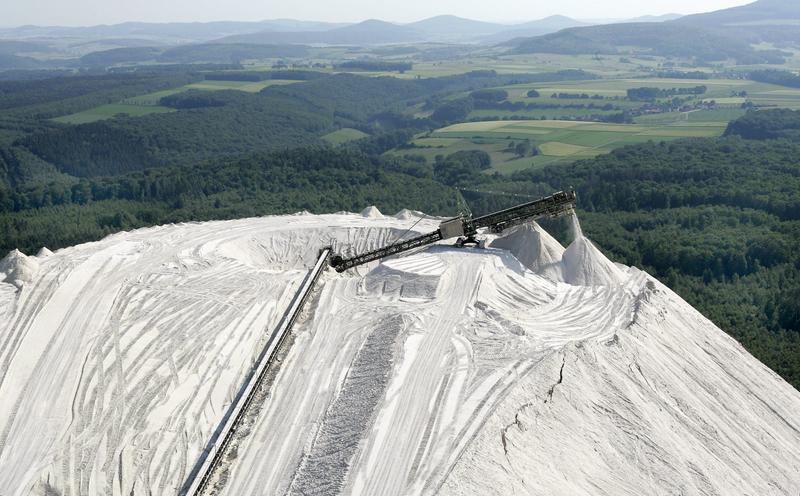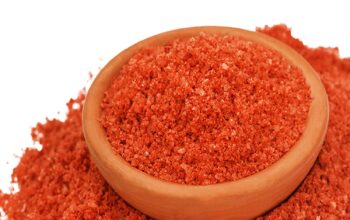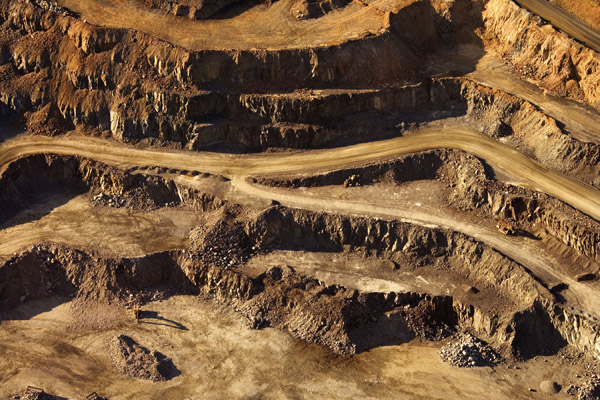Shigemura Hiroyuki (Tokyo, Japan)
In the summer of 1790, President George Washington signed the first patent ever issued in the United States, which was to be used for a new process and apparatus for making potash, America’s first industrial chemical. While the patent expired fourteen years later, potash remains an important product used globally today. There are nowadays quite a few companies exploring, developing and producing potash around the world. In terms of investment opportunities, many potash-focused companies, such as Agrium and Potash, have been acquired by larger rivals over the years. Israel Chemicals, K+S or Mosaic Company, however, both have substantial potash operations and those investors seeking a diversified play on Potash, they may consider investing into the Global X Fertilizers/Potash ETF (SOIL), an exchange traded fund that tracks the Solactive Global Fertilizers/Potash Total Return Index.
Potash has seen a slow few years due to low prices, oversupply and farmers tightening their belts. The COVID-19 pandemic is applying further pressure, but major players, including ASX-, TSX- and TSXV-listed potash stocks, remain confident in the long-term outlook for the potash market. Potash increases crop yields and food quality using more limited land, which will be vital if the world is to feed itself as the global population continues to increase and people’s dietary habits change. Therefore, demand for potash fertilizers is set to rise over the coming years, which may be positive news for prospective investors in the industry. The following first part of the list featuring (in the alphabetical order) ten ASX-, TSX- and TSXV-listed potash companies, which are exploring, developing and producing potash in Australia, Belarus, Canada, Russia, parts of Africa and elsewhere around the world, is designed to help those interested in the space learn about the investment opportunities.
AGRIMIN, a Western Australian-based minerals company, owns the large-scale Mackay sulfate of potash (SOP) project, which is located on a Western Australian salt lake and covers 2,560 square kilometers. Mackay holds the largest-known brine-hosted SOP resource in the world with a maiden ore reserve of 20 million tones (Mt) of SOP. A definitive feasibility study for the project released in mid-2020 shows a post-tax net present value (NPV) of US$655 million at an 8% discount, and an internal rate of return of 21%. Agrimin believes Mackay can be the world’s lowest-cost producer of SOP.
AUSTRALIAN POTASH’s main asset is the Lake Wells potash project in Western Australia, though the company also holds a number of gold and base metals projects. At Lake Wells, the company is exploring for SOP, and is targeting domestic demand from Australian farmers. A definitive feasibility study for Lake Wells completed last year identified a mine life of 30 years that could potentially extend to over 50 years. Strong project economics include a NPV of AU$665 million at an 8% discount. Australian Potash has also secured a 10 year offtake agreement for potash products from Lake Wells. the environmental review document for Lake Wells is currently being assessed by the Environmental Protection Authority (EPA).
BHP is a well-known Australian-American-owned global mining giant with assets in oil and gas, and an array of minerals, including potash. Since 2010, BHP has been investing in the Jansen potash project in Saskatchewan, and has been slowly developing the site. In February 2020, BHP said it would ask its board for Stage 1 project approval in 2021, having spent more than US$2.7 billion on Jansen so far, which is estimated to be 84% complete. The capital cost to get Jansen into production is estimated to be between US$5.3-5.7 billion.
DANAKALI focuses on developing the Colluli potash project in Eritrea, which is wholly owned by Colluli Mining Share Company (CMSC). CMSC is a 50/50 joint venture between Danakali and Eritrean National Mining Company. With a JORC-compliant resource estimate of 1.289 billion tones at 11% K2O for contained SOP of 260 Mt, and a JORC-compliant ore reserve estimate of 1,100 Mt at 10.5% K2O for 203 Mt of contained SOP equivalent, the company believes Colluli is a world-class project. The Colluli project is nearing the construction phase as Danakali seeks to secure financing, and the company expects the project to reach commercial production in late 2022.
EMMERSON, a company registered in the Isle of Man and listed in London, is focused on the development of the Khemisset project, a ‘low capex, high margin’ potash project in Northern Morocco. The miner is aiming to produce around 800,000 tones of MOP per year over the initial mine life of 20 years. Emmerson says the pre-production capex of $406 million is ‘less than half of its global peer average’. In June, Emmerson Plc, released a feasibility study for its flagship Khemisset potash project, which confirmed that the deposit has the potential to be, as the company stated, a “world class, low capital cost, high margin potash mine.”
GALAXY RESOURCES operates the Sal de Vida project in Argentina, though it may be known mainly for its lithium production, mining and chemicals. Sal de Vida is estimated to hold combined proven and probable reserves of 1.1 Mt of retrievable lithium carbonate equivalent and 4.2 Mt of potash. This reserve estimate translates to a mine life of 40 years for 25,000 tones per year of battery-grade lithium carbonate and 95,000 tones per year of potash on average. In mid-2020, the Western Australia-based company said that engineering and design work was progressing, with production at Sal de Vida slated for 2022.
GENSOURCE POTASH CORPORATION, a fertilizer development company focused on sustainable potash production, develops the Tugaske Project. Located in the Canadian province of Saskatchewan, this project will be developed on Gensource’s wholly-owned Vanguard Area. The plant site will be constructed on land that has no environmental sensitivities or concerns. The development permit for the Tugaske Project was approved by RM Council at its August meeting, opening the way to construct the first potash module within the boundaries of the municipality. With the environmental assessment approval already complete, the Tugaske Project is ready to proceed to construction upon securing project financing.
HIGHFIELD RESOURCES is an Australian business that is developing five projects that cover 550 square kilometers in Northern Spain’s Ebro potash-producing basin, giving it the potential to find a lucrative source for the European market. The company completed a definitive feasibility study for its Muga project in 2015, received an environmental permit in mid-2019 and now expects to receive a mining concession by the end of 2020. Already in 2020, the company has succeeded in securing an offtake agreement with Swiss-based agri-trader Keytrade.
INTREPID is a smaller US-based potash producer established in 2000 when it acquired assets from Potash Corp that supplies magnesium, potassium, sulfur, salt and water to help grow crops, produce animal feed and for use in the oil and gas industry. The Denver, Colorado-based company owns and runs three mines: Wendover and Moab in Utah, and Calrsbad in New Mexico. These are solar evaporation mines, which ‘provide one of the safest, lowest cost, environmentally friendly production methods for potash and salt’. It also has an underground mine at Carlsbad that hosts langbeinite, a rare naturally-occurring mineral that is ‘found only in a few places in the world’. This too is used in fertilizer, giving the company a potential edge in the market.
ISRAEL CHEMICALS, also known as ICL, is an Israeli company dual-listed in Tel Aviv and New York. ICL has gradually expanded into a global business since helping to establish its home country’s potash industry 80 years ago. Israel Corp, Israel’s largest holding company, owns just over 45% of the business. As the world’s sixth largest potash producer, the company is responsible for over one-third of global production of bromine, which is used in agricultural chemicals, dyestuffs, insecticides and pharmaceuticals. ICL has become one of the largest providers of specialty fertilizers, bromine and flame-retardants, and a significant supplier of pure phosphoric acid. Its operations include the Boulby mine in the UK, where the company has shifted towards exclusive production of Polysulphate, claiming to be ‘the first and only supplier of this new and unique fertilizer’.




